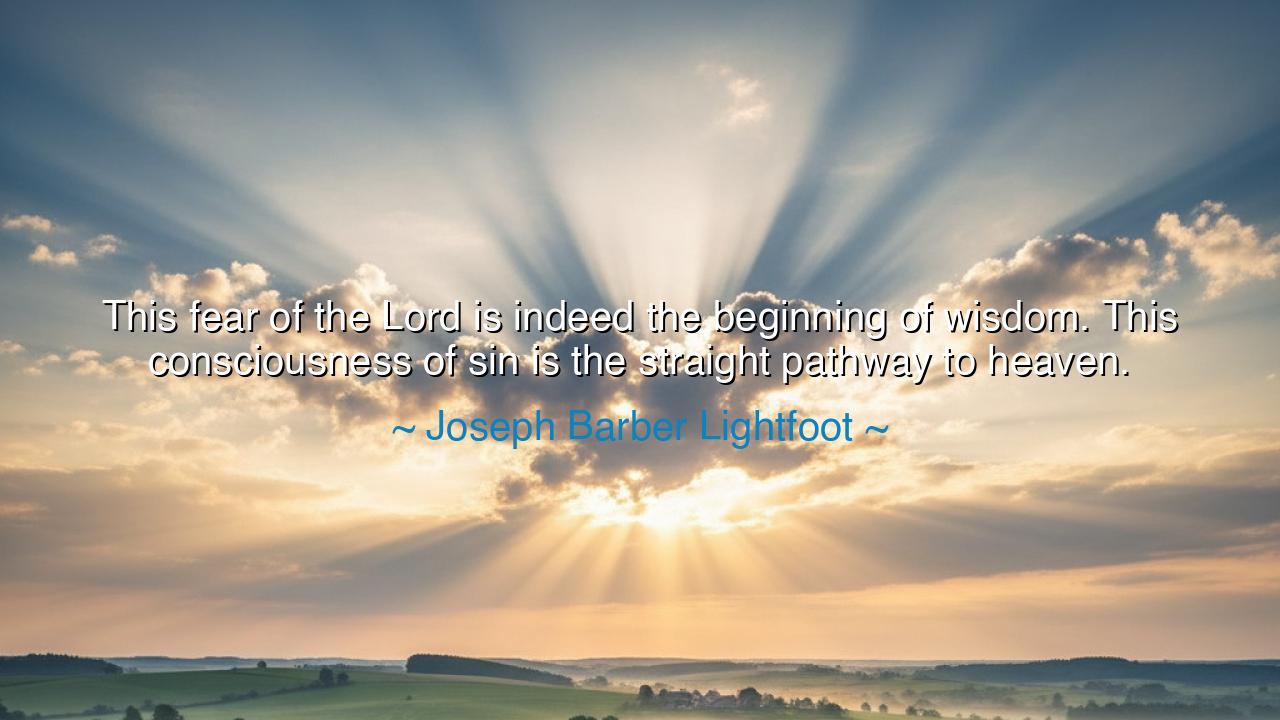
This fear of the Lord is indeed the beginning of wisdom. This
This fear of the Lord is indeed the beginning of wisdom. This consciousness of sin is the straight pathway to heaven.






Hearken, O children of reflection, to the solemn counsel of Joseph Barber Lightfoot, who illumines the sacred path of wisdom through reverence and self-examination. He teaches that the fear of the Lord is the beginning of wisdom, a reverent awe that guides the heart, tempers desire, and awakens the soul to truths beyond mortal perception. In this fear lies the recognition of a power greater than ourselves, a force whose justice and mercy shape the moral fabric of existence.
The origin of this reflection is rooted in Lightfoot’s life as a theologian and scholar of the early Church, devoted to the study of scripture and the moral teachings of Christ. In his writings, he emphasized that human understanding is incomplete without the acknowledgment of the Divine, and that consciousness of sin—awareness of our own failings and shortcomings—is the gateway to spiritual growth. The recognition of moral imperfection, far from despairing, directs the soul along the straight pathway to heaven.
The meaning of this aphorism is profound: wisdom is inseparable from humility, reverence, and self-awareness. The fear of the Lord is not a terror that paralyzes, but a guiding principle that illuminates right action and cultivates virtue. Likewise, the recognition of one’s sins fosters reflection, repentance, and the refinement of character. To know oneself in relation to the Divine is to walk with clarity along the path of justice, compassion, and eternal life.
History bears witness to this teaching. Consider St. Augustine, who, in the turmoil of his early life, recognized his own moral failings and turned to a life of devotion and study. His consciousness of sin and reverent fear of God guided him toward profound theological insight, and his writings continue to illuminate the spiritual path for countless generations. Here, the principle Lightfoot describes is made manifest: self-awareness and reverence are the twin pillars of wisdom.
Moreover, this teaching extends beyond saints and theologians to every seeker of virtue. Every mortal who contemplates the weight of their actions, who reflects upon their failings and their duties, is practicing the sacred art of wisdom. The fear of the Lord awakens discernment, the consciousness of sin fosters humility, and together they illuminate the path to moral and spiritual fulfillment.
O generations yet unborn, carry this counsel within your hearts: revere the Divine, examine your own failings with honesty, and let these twin practices guide your life. For in the fear of the Lord and the recognition of sin, the soul discovers the beginning of wisdom, and treads the straight path toward heaven, where virtue, understanding, and eternal light endure forever.






HDHuong Doan
This quote prompts reflection on the role of ethical consciousness in human development. Is the ‘fear of the Lord’ more about cultivating moral discernment and responsibility, or is it primarily a spiritual obedience? I’m also curious how contemporary thinkers reconcile the idea of fear as the starting point of wisdom with modern approaches emphasizing rationality, empathy, and emotional intelligence. Finally, how might this principle guide practical choices in everyday life, from interpersonal relationships to broader societal ethics?
LLLuu Le
Reading this, I’m intrigued by the emphasis on self-awareness as a spiritual pathway. How does acknowledging one’s sins or moral failings lead to personal transformation or spiritual elevation? I also wonder how this concept has been interpreted across different cultures and religious traditions. Does a fear-driven approach to wisdom foster humility and discipline, or could it risk guilt, anxiety, and rigidity? What mechanisms help ensure that this awareness leads to constructive growth rather than paralyzing self-criticism?
DDNguyen Duc Duong
I find this statement thought-provoking because it links wisdom directly to religious awareness. Does this imply that wisdom is inaccessible without belief in God, or could the principle of humility and recognition of one’s faults serve a similar function in a non-religious context? It also raises questions about the balance between fear and love in motivating moral behavior: is fear alone sufficient, or does it need to be coupled with understanding, compassion, and a desire to improve?
NDhuy nguyen dinh
This quote makes me reflect on the connection between morality, spirituality, and wisdom. How does the fear of a higher power guide ethical behavior in practical terms? I’m curious whether this fear is intended as reverence and respect or as anxiety over divine judgment. Additionally, how does a consciousness of personal shortcomings or sin contribute to spiritual growth and ethical decision-making, and can this concept be reconciled with secular approaches to self-improvement and morality?